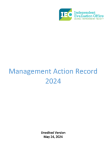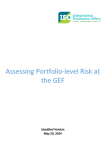Food systems significantly impact various facets of our world, including global health, food security and nutrition, economic and social development, and, importantly, the quality and status of the natural environment and the critical ecosystem services it provides. In fact, food systems are…
Food Systems Approach Paper
LDCF SCCF AER 2024 Audit Trail
Pacific SIDS Approach Paper
Management Action Record (MAR) 2024
The GEF Independent Evaluation Office (IEO) prepares the Management Action Record (MAR) to track the implementation of Management’s action plans to address evaluation recommendations. MAR 2024 covers 20 evaluations, including 18 presented to the GEF Council, one to the LDCF Council, and one…
Policy Coherence Concept Note Audit Trail
Policy Coherence Concept Note
MAR 2024 Annex
Policy Coherence
Policy coherence, as defined in Global Environment Facility (GEF) documents, refers to "the systematic promotion of mutually reinforcing policy actions across government departments and agencies, creating synergies towards achieving the agreed objectives." Enhancing policy coherence has the…
Assessing Portfolio-Level Risk at the GEF
The Global Environment Facility (GEF) aims to embrace more calculated risks in its efforts to achieve transformative environmental outcomes. Currently, the GEF portfolio has a low to moderate risk profile. The majority of projects in the portfolio are categorized as low-risk and have generally…



